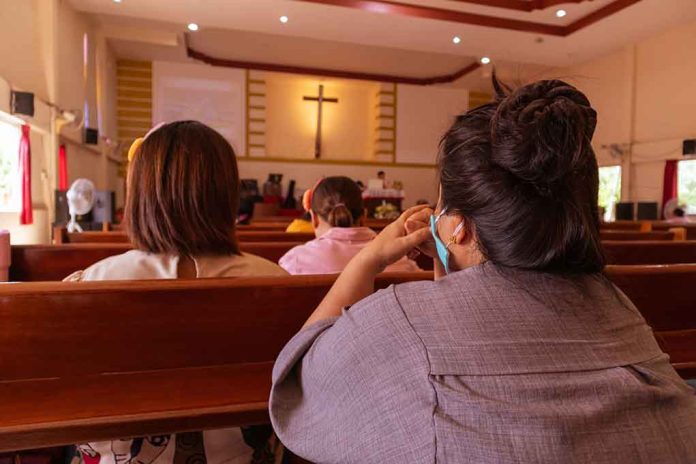
The Los Angeles Archdiocese’s $880 million settlement for clergy abuse claims exposes a dark chapter in the Church’s history, leaving many to question how such widespread abuse could have occurred within a supposedly sacred institution.
At a Glance
- Los Angeles Archdiocese settles 1,354 child sex abuse claims for $880 million
- Largest single child sex abuse settlement with a Catholic archdiocese in history
- Settlement made possible by California law lifting statute of limitations for past abuse claims
- Archdiocese’s total payout for sex abuse cases reaches $1.5 billion over 20 years
- Church faces challenge of rebuilding trust and implementing reforms
A Staggering Settlement Reveals Decades of Abuse
In a move that has sent shockwaves through the Catholic community and beyond, the Archdiocese of Los Angeles has agreed to pay an astounding $880 million to settle over 1,300 claims of child sexual abuse. This settlement, the largest of its kind involving a Catholic archdiocese, lays bare the horrifying extent of clergy misconduct and the Church’s failure to protect its most vulnerable members.
The magnitude of this settlement raises serious questions about the moral bankruptcy that has plagued certain sectors of the Church. How could an institution that preaches virtue and righteousness harbor such evil for so long? The answer lies in a toxic combination of secrecy, misplaced loyalty, and a bureaucratic structure that prioritized the Church’s reputation over the safety of children.
California Law Opens Door for Justice
It’s worth noting that this landmark settlement was only made possible due to California Assembly Bill 218, which lifted the statute of limitations for past sexual abuse claims involving minors. This legislation, passed in 2019, demonstrates the crucial role that conservative values of law and order play in holding institutions accountable and providing justice for victims, even decades after the crimes occurred.
The sheer number of claims – 1,354 in total – paints a devastating picture of systemic abuse that spanned generations. Each of these cases represents a life forever altered by the very individuals who were supposed to offer guidance and protection. The betrayal is immeasurable, and the damage to the faith community is profound.
Financial Reckoning and Church’s Future
This $880 million settlement brings the total amount paid by the Los Angeles Archdiocese for sex abuse cases to a staggering $1.5 billion over the past two decades. The financial toll on the Church is enormous, but it pales in comparison to the emotional and spiritual toll on the victims and their families. The Archdiocese claims it will finance this settlement using reserves, investments, loans, and other assets, without touching donations earmarked for parishes or schools.
While Archbishop José H. Gomez has expressed sorrow and hope for healing, words alone are insufficient. The Church must take concrete steps to ensure such widespread abuse never happens again. This includes implementing rigorous background checks, improving reporting mechanisms, and fostering a culture of transparency and accountability at all levels of the organization.
A Call for Reform and Renewal
As conservatives, we believe in the importance of traditional institutions and the valuable role they play in society. However, we also demand integrity and accountability from these institutions. The Catholic Church, like any organization, must earn the trust of its members and the wider community. This settlement should serve as a wake-up call for all religious institutions to examine their practices and prioritize the protection of the innocent above all else.
The road to healing will be long and arduous for the victims, their families, and the Catholic community as a whole. It is crucial that the Church not only provide financial compensation but also offer comprehensive support services, including counseling and spiritual guidance, to those affected by this tragedy. Only through genuine repentance, reform, and a renewed commitment to its core values can the Church hope to regain the trust of its faithful and continue its mission in the modern world.
As this dark chapter in the Church’s history comes to a close, let it serve as a somber reminder of the consequences of unchecked power and the importance of vigilance in protecting the most vulnerable among us. The conservative principles of personal responsibility, accountability, and moral integrity must be at the forefront as we move forward, ensuring that such a betrayal of trust never happens again.






















